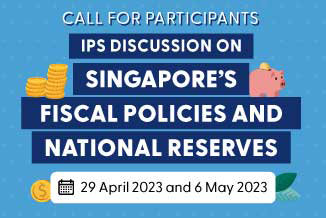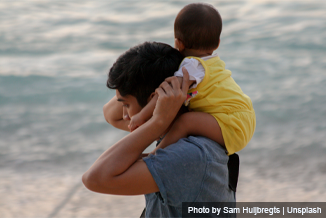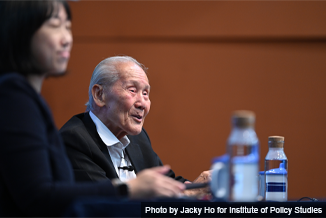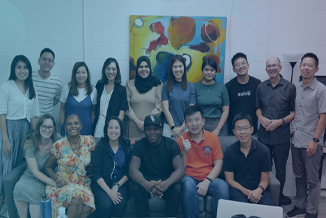In the Spotlight

On 27 February 2023, Minister in the Prime Minister’s Office and Second Minister for Finance and National Development Ms Indranee Rajah spoke to IPS Corporate Associates for a post-Budget 2023 lunch discussion.
Amidst the backdrop of rising cost of living and inflation, as well as uncertain macro-economic and geo-political conditions, some of the topics discussed include the support introduced for Singaporeans and businesses, and also the incentives doled out in Budget 2023 for families.
Find out more about the IPS Corporate Associates programme here.

Call for Participants: IPS Discussion on Singapore’s Fiscal Policies and National Reserves
IPS is organising a two-day discussion on 29 April and 6 May 2023 to gather views of a diverse group of 100 Singapore citizens aged 21 years and above on its fiscal policies and the National Reserves. No expert knowledge is required.
IPS researchers and a special group of speakers will share the facts and guiding principles of this area of public policy to hear what ordinary citizens have to say as Singapore and the world enter an era of radical economic and geopolitical uncertainty.
Click on this link to learn more and sign up for the discussions.
Articles

Commentary — Righting the wrongs of misinformation merchants
(360info)
By Carol Soon
• 5-min read
In this piece, IPS' Carol Soon writes about what the public looks for in determining online falsehoods.
A study carried out by IPS revealed that the style of reporting and the language used served as signposts for participants to decide where they should place their trust online.
The piece also emphasises that governments, civil society and practitioners should pay attention to how they deliver their messages in order to stay ahead of misinformation.

Commentary — Must you speak English to qualify as a Singapore PR or new citizen?
(The Straits Times)
By Mathew Mathews and Melvin Tay
• 8-min read
Following Mr Pritam Singh's proposal to include English language testing as an assessment criterion for Singapore citizenship or permanent residency, debates have been ongoing on whether English proficiency should be used to decide one's suitability for citizenship in Singapore.
IPS' Mathew Mathews and Melvin Tay weigh in on the matter, agreeing that immigration policy should give heavier weightage to the ability of individuals to integrate and establish roots in Singapore. However, they argue that this should entail more than just testing one's proficiency in the English language.

Commentary — Singapore has a short 15-year window to promote parenthood. It starts now
(The Straits Times)
By Gillian Koh and Gabriel Lim
• 8-min read
According to population data trends, the larger number of Millennials and older Gen-Zs in Singapore means that the country has a better chance of reversing its declining population growth trend if this group feels more encouraged to have children.
In this op-ed for The Straits Times, IPS' Gillian Koh and Gabriel Lim analyse the reasons behind why young adults do not want to start families, the policies in place to boost the country's birth rate, and what more can be done to understand the younger generation in this respect.

Commentary — Why Putin must not be allowed to succeed in his act of aggression
(The Straits Times)
By Tommy Koh
• 7-min read
In this op-ed, Prof Tommy Koh, Special Adviser to IPS, writes on the first anniversary of Russia's invasion of Ukraine that the world must not let Russia succeed in its act of aggression.
Although some have deemed the war as a distant proxy war between Russia and the West, Prof Koh argues that the war is about every country's right to independence and sovereignty, which affects every country in the world.

Commentary — Governance in a Web 3.0 future
(The Business Times)
By Woo Jun Jie and R Avinash
• 7-min read
Decentralised finance (DeFi) as a whole has seen a fall in investments, given the recent spate of cryptocurrency failures such as the FTX crash.
However, IPS' Woo Jun Jie and R Avinash write that it was the centralisation of opaque systems rather than decentralisation that led to many of the crypto crashes. They also argue that this misconception of decentralisation prevents us from making full use of its benefits, such as for streamlining policymaking processes.

Event Summary — IPS-Nathan Lecture III by Professor Wang Gungwu
By IPS Public Affairs
• 9-min read
Prof Wang Gungwu, 12th S R Nathan Fellow for the Study of Singapore, delivered his third lecture on 8 February 2023. The lecture, titled "Enlightened Modern", centred on the national empires that emerged from the Enlightenment and their quest to impose "modern" standards of civilisation on lands deemed backward and inefficient. Prof Wang also illustrated how different civilisations in Asia, namely the Indic, Islamic and Sinic, each engaged with the Enlightenment modernity.
The Q&A session was moderated by Prof Elaine Ho, Professor at the Department of Geography and Senior Research Fellow at the Asia Research Institute, NUS. The discussion that ensued surrounded several topics such as the roles of religion and history in the diplomacy and foreign policy of nation states today and the malleability of cultural and civilisational legacies in nation-building initiatives.
Watch all four lectures in the series here.
Learn more about the lecture series here.

Commentary — 梁凯欣:罗宾汉的预算案? (Translation: A Robin Hood budget?)
(Lianhe Zaobao)
By Liang Kaixin
• 3-min read
To what extent should higher income groups shoulder more responsibilities in society?
In this op-ed for Lianhe Zaobao, IPS' Liang Kaixin writes about the distributive wealth policies highlighted in Budget 2023, including higher taxes on luxury cars and houses. She discusses the importance of these policies in reducing the wealth gap in Singapore, and strengthening the new social compact.

Commentary — More paternity leave is promising, but Singapore could be so much bolder
(CNA)
By Mathew Mathews and Melvin Tay
• 4-min read
It was announced at Budget 2023 that government-sponsored paternity leave will be doubled to four weeks from next year.
In this op-ed, IPS' Mathew Mathews and Melvin Tay write that this move will be helpful in encouraging fathers to be more active in parenting.
However, they also argue that more can be done to further lessen the caregiving burden on mothers, such as introducing mandatory paternity leave and shifting workplace attitudes to ensure that fathers take up this leave more readily.

Commentary — Snap Insight: Raising CPF monthly salary ceiling will reduce take-home pay for some, but there are payoffs
(CNA)
By Christopher Gee
• 2-min read
In this piece for CNA, IPS' Christopher Gee analyses the significance of the announced increase in the CPF monthly salary ceiling at Budget 2023. It will be gradually increased from S$6,000 a month to S$8,000 a month by 2026.
Although this will result in lower take-home pay for workers earning more than S$6,000 a month, some benefits of this move include greater long-term retirement savings as well as being better able to pay off housing loan commitments through CPF.

Commentary — Budget 2023 not simply a Budget of redistribution
(The Straits Times)
By Gillian Koh
• 4-min read
In giving an overview of the major announcements at this year's Budget, IPS' Gillian Koh shares that Budget 2023 is not simply redistributive, but also provides substantial support for businesses to grow the economic pie.
She also writes that this year’s budget has put Singaporeans at the heart of the announcements, especially given the turbulent political and economic events that have been occurring around the world.

Excerpt — Unremarkable Inclusion
(IPS Commons)
By Justin Lee
• 5-min read
In this excerpt from his chapter in the newly published book, "Not Without Us: Perspectives on Disability and Inclusion in Singapore", IPS' Justin Lee discusses the complex notion of inclusion when it comes to people with disabilities (PWDs).
He explains the concept of "unremarkable" inclusion as compared to "noticeable" inclusion, which involves having systems that integrate PWDs without having to specially spotlight their disabilities. He also writes that inclusion for PWDs requires the need to challenge our society's emphasis on material success and one's desirability in the marketplace.
Recent Releases on the IPS Website

The Year in Review: Policy and Political Developments in 2022
The Year in Review 2022 provides an overview of key policy and political developments in 2022. It was a significant year for the process of leadership transition given the announcement that Finance Minister, Mr Lawrence Wong, is the fourth-generation leaders’ choice to succeed Prime Minister Lee Hsien Loong. It was also the year when Singapore fully transitioned towards an endemic COVID-19 world with its high vaccination rates. The strong reopening of the economy was evident from the rebound in many sectors. Nonetheless, the trends were dampened by external shocks such as global inflation and geopolitical tensions that exacerbated supply chain disruptions.

Report for the Ngee Ann Kongsi Community Fellowship — Photovoice to Discover Community Assets in a Mature Neighbourhood in Singapore
Ng Bee Leng, the 2021 Ngee Ann Kongsi Community Fellow, conducted a photovoice project with residents in Teck Ghee. This participatory research project gathered the residents’ personal stories, from their daily routines to lesser known histories of the neighbourhood. Beyond providing a collective sense of the people, places, amenities and institutions, such mutual sharing of stories transforms the ways in which the residents understand their own role within the community, the different needs of others, the invisible community assets and opportunities for exchange.
The findings of the project will also inform Ang Mo Kio Family Service Centre’s asset-based community development work.

Report on Baltimore Study Trip 2022
IPS, in partnership with Tote Board, has been organising the Transforming the Non-Profit Sector series. As part of the series, Dr Justin Lee and 16 Singaporean social workers, funders and non-profit practitioners visited Baltimore, Maryland, in the United States of America.
They met with and learnt from the organisers of the Baltimore Algebra Project, the Baltimore Roundtable for Economic Democracy and various worker-owned co-operatives. The participants were inspired to re-examine their own worldviews and to consider other possibilities in delivering social interventions. This report highlights the key take-aways from the study trip.
IPS in the News
For media coverage of IPS experts' views on current affairs and IPS events, click here.
For upcoming IPS events, click here. Sign up for the IPS events mailing list here.
Careers at IPS — please check us out and help to spread the word!